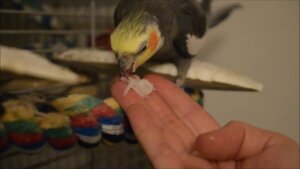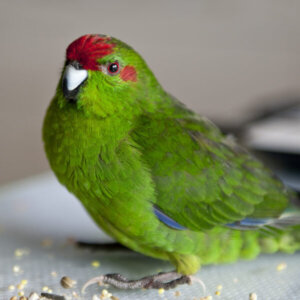Is My Kakariki Sick? Signs, Symptoms, and Solutions
Yes, your Kakariki might be sick. Kakarikis, like other pets, can fall ill. It’s essential to spot the signs early.
Kakarikis are active and colorful parrots. Their health can change quickly. Noticing the signs of illness early can make a big difference. Common signs of a sick Kakariki include changes in behavior, appearance, and eating habits. Understanding these signs helps in getting timely medical help.
It is vital to watch your Kakariki closely and know what is normal for them. This blog post will guide you through the signs of illness and what steps to take. Your Kakariki’s well-being depends on your careful observation and quick action. Let’s ensure your feathered friend stays healthy and happy.

Credit: m.youtube.com
Common Symptoms
Recognizing the signs of illness in your Kakariki is vital. Birds often hide their sickness to avoid predators. Pay attention to these common symptoms. They will help you know if your Kakariki needs a vet.
Kakarikis are active and curious birds. Behavior changes can be a sign of illness. Watch for:
- Lethargy or unusual tiredness
- Excessive sleeping
- Decreased vocalizations
- Less interest in playing or interacting
If your Kakariki shows any of these signs, it may be sick. Act quickly and consult a vet.
Feathers are a good indicator of your Kakariki’s health. Poor feather health can indicate illness. Look for:
| Symptom | Description |
|---|---|
| Fluffed up feathers | Bird looks puffed up and larger than usual |
| Feather loss | More feathers than usual in the cage |
| Dirty or matted feathers | Feathers appear unkempt or sticky |
Healthy feathers are smooth and clean. If you see any issues, your bird might be sick.
Eating Habits
Changes in eating habits are significant. A healthy Kakariki loves to eat. Be aware of:
- Reduced appetite or not eating at all
- Changes in droppings
- Weight loss
- Difficulty swallowing
Monitor your bird’s food intake. Any changes could be a sign of illness. Visit a vet if these symptoms persist.
Behavior Changes
Recognizing behavior changes in your Kakariki is crucial for its well-being. A healthy bird is usually active and curious. If you notice changes, your pet might be sick. Below are some key signs to look for.
Lethargy
If your Kakariki is less active than usual, it could be lethargy. Healthy birds are energetic and playful. A lethargic bird might sleep more or stay in one spot. This could be a sign of illness. Monitor their activity levels closely.
Unusual Vocalizations
Kakarikis are known for their lively and varied vocalizations. Changes in their usual sounds can indicate a problem. A sick bird might become quieter or make distressed noises. Pay attention to these vocal changes.
Aggression
A normally friendly Kakariki showing aggression can be alarming. It may bite or lash out unexpectedly. This change in behavior might be due to discomfort or illness. Observe any aggressive tendencies carefully.
Physical Signs
Observing your Kakariki’s physical condition is crucial for their health. Certain physical signs can indicate illness. Knowing these signs helps in seeking timely veterinary care.
Eye Discharge
Eye discharge in Kakarikis can be a sign of illness. Clear or colored discharge suggests an infection. Check for swelling or redness around the eyes. These symptoms may need professional treatment.
Labored Breathing
Watch your Kakariki’s breathing patterns. Labored breathing indicates potential respiratory issues. Listen for wheezing or clicking sounds. These signs can mean serious health problems.
Weight Loss
Weight loss in Kakarikis is a major concern. Regularly monitor their weight. Sudden weight loss can be a sign of illness. Ensure they eat a balanced diet.
Feather Health
Feathers are a critical indicator of your Kakariki’s health. Observing their feathers can reveal signs of illness. Healthy feathers are vibrant and smooth. Any deviation from this norm might suggest a problem. Below are common issues related to feather health in Kakarikis.
Feather Plucking
Feather plucking is a common issue. It can indicate stress, boredom, or health problems. Look for patches where feathers are missing. This behavior can lead to skin infections and further health complications.
| Possible Causes | Solutions |
|---|---|
| Stress | Provide a calm environment. |
| Boredom | Introduce new toys and activities. |
| Health Issues | Consult a vet. |
Dull Plumage
Dull plumage can be a sign of poor nutrition or illness. Feathers should be bright and smooth. If they appear faded, it might indicate a deficiency or disease. Ensure your Kakariki receives a balanced diet rich in vitamins.
- Bright and colorful feathers indicate good health.
- Dull feathers suggest nutritional deficiencies or illness.
Bald Spots
Bald spots can be alarming. These can result from feather plucking, mites, or infections. Check for any red or inflamed areas. If you notice bald spots, seek veterinary advice.
- Observe for red or inflamed skin.
- Note the size and location of bald spots.
- Consult with a veterinarian promptly.
Eating And Drinking
Monitoring your Kakariki’s eating and drinking habits is crucial for their health. Changes in these habits can indicate illness or stress. Let’s explore some key signs to watch out for.
Loss Of Appetite
Has your Kakariki stopped eating? A loss of appetite can be a serious sign. Birds need regular food to stay healthy. If your bird skips meals, check for other symptoms.
Use the following checklist to monitor their eating habits:
- Is the bird eating less than usual?
- Are there uneaten seeds or pellets in their dish?
- Does the bird show interest in food but not eat?
If you observe any of these signs, consult a vet. Early detection can prevent serious health issues.
Increased Thirst
Increased thirst can also signal health problems. Birds should drink regularly, but excessive drinking is a red flag.
Watch for these signs:
- Is the water dish emptying faster than usual?
- Does the bird frequently dip its beak in water?
- Are there signs of dehydration, like dry skin or dull feathers?
Increased thirst can indicate kidney issues or diabetes. Do not delay in seeking veterinary advice.
Change In Droppings
Changes in your bird’s droppings can indicate health problems. Healthy droppings are firm, green, and white.
Observe for these changes:
| Change | Possible Cause |
|---|---|
| Watery droppings | Diarrhea, infection |
| Discolored droppings | Liver disease, diet changes |
| Foul-smelling droppings | Bacterial infection |
Any significant change requires prompt veterinary attention. Proper diagnosis and treatment are essential for your bird’s health.

Credit: www.reddit.com
Environmental Factors
Environmental factors play a crucial role in keeping your Kakariki healthy. Neglecting these aspects can lead to sickness. This section will cover important environmental factors to consider.
Cleanliness
Maintaining a clean environment is essential. A dirty cage can harbor bacteria and parasites. Clean the cage at least once a week. Change the water and food dishes daily. Remove uneaten food to prevent mold growth. Regularly clean perches and toys to avoid contamination.
Cage Size
Kakarikis are active birds and need space to move. A small cage can lead to stress and health problems. Ensure the cage is large enough for flying and playing. The minimum recommended size is 24x24x24 inches. A larger cage is always better. Provide plenty of perches and toys to keep your bird engaged.
Temperature
Temperature plays a significant role in your Kakariki’s health. Keep the cage in a room with stable temperatures. Avoid placing the cage in direct sunlight or near drafts. The ideal temperature range is between 65°F and 75°F. Sudden temperature changes can stress your bird. Use a thermometer to monitor the temperature.
Preventative Care
Preventative care is essential to keep your Kakariki healthy and happy. Regular vet visits, a balanced diet, and mental stimulation play crucial roles. Below are some key steps to ensure your feathered friend stays in top shape.
Regular Vet Visits
Make sure to schedule regular vet visits for your Kakariki. These visits help catch any health issues early. A vet can also provide valuable advice on nutrition and behavior. Aim for at least two check-ups per year.
| Frequency | Reason |
|---|---|
| Twice a year | General health check |
| As needed | Specific health concerns |
Balanced Diet
A balanced diet is crucial for your Kakariki’s health. Provide a mix of seeds, fruits, and vegetables. Avoid foods high in fat and sugar. Ensure fresh water is always available.
- Seeds: 60% of the diet
- Fruits: 20% of the diet
- Vegetables: 20% of the diet
Consult your vet for specific dietary recommendations.
Mental Stimulation
Keep your Kakariki mentally stimulated with toys and social interactions. Mental stimulation prevents boredom and related health issues. Rotate toys to keep them engaging. Spend time interacting with your bird daily.
- Provide a variety of toys
- Rotate toys weekly
- Include puzzle toys
- Engage in daily social interactions
Mental stimulation is as important as physical health for your Kakariki.
When To Seek Help
Recognizing the signs of illness in your Kakariki can be challenging. Acting promptly is crucial for their health. Knowing when to seek help can make a significant difference in your bird’s recovery and overall well-being.
Emergency Signs
Immediate action is necessary if you notice any of the following emergency signs:
- Labored breathing or open-mouth breathing
- Severe lethargy or inability to stand
- Unusual droppings – black, red, or watery
- Visible injuries or bleeding
- Sudden weight loss or refusal to eat
Choosing A Vet
Not all vets are experienced with birds. Select a vet who specializes in avian care. Here are some tips:
- Check for avian certifications
- Read online reviews and ask for recommendations
- Ensure the vet has proper facilities for bird care
What To Expect
When visiting the vet, you can expect:
- Physical examination of your Kakariki
- Discussion about symptoms and history
- Possible diagnostic tests (blood tests, X-rays)
- Recommendations for treatment and care
Follow the vet’s advice for the best outcome. Keep monitoring your bird’s health regularly to ensure a happy, healthy life.

Credit: www.reddit.com
Frequently Asked Questions
How Can I Tell If My Kakariki Is Sick?
Observe for changes in behavior, appetite, or droppings. Symptoms like lethargy, fluffed-up feathers, or respiratory issues indicate illness.
What Are Common Kakariki Illnesses?
Common illnesses include respiratory infections, feather plucking, and digestive issues. Always consult a vet for proper diagnosis.
Why Is My Kakariki Losing Feathers?
Feather loss can be due to molting, stress, or illness. Monitor your bird and seek veterinary advice if concerned.
When Should I Take My Kakariki To The Vet?
Visit the vet if your Kakariki shows signs of illness, such as unusual behavior, weight loss, or abnormal droppings.
Conclusion
Caring for a Kakariki can be challenging. Notice any unusual behavior? Act quickly. Early intervention often prevents bigger health issues. Consult a vet for expert advice. Regular check-ups ensure your Kakariki stays healthy and happy. Keep their environment clean and stress-free.
A healthy diet is crucial. Stay observant. Your pet’s health relies on your vigilance. A little effort goes a long way. Your Kakariki deserves the best care.
Hello Dear, I'm Poli Kolymnia, owner of many birds (including budgies).
With a deep passion for these feathered companions, I'm here to share my expertise and extensive knowledge on birds care.
My articles cover essential topics like diet, housing, care, and health, providing practical tips to help you create a happy and thriving environment for your birds.




